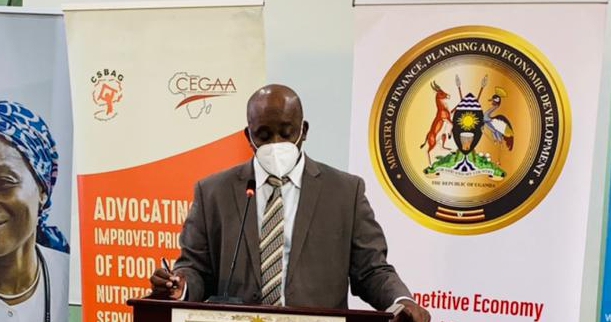Kampala-Government has been urged to borrow only for projects its ready to start implementing to lessen the burden of public debt in the country.
As of December 2021, Uganda’s total public debt stock stood at UGX 73.5 trillion.
Speaking during the CSO Post Budget Dialogue held in Kampala on Thursday, Julius Mukunda, the Executive Director Civil Society Budget Advocacy Group (CSBAG) said “One of our concerns is Uganda’s public debt which is ‘a ticking time bomb’ and if not addressed, will derail our development agenda. Borrowing wouldn’t be bad but we need to have smart loans ie ones with low interest rates and long grace periods. Let’s also borrow for projects that we are ready to do not to borrow and we get stuck with money.”
He added, We are having challenges mainly on slow implementation of projects and ability to absorb the money that we have borrowed. Apparently right now we have UGX 5.5 billion dollars of un dispersed loans which is the challenge with our debt. If we could improve on absorption and execution of projects, we wouldn’t be having problems with the debt.
Mukunda also highlighted the need for salary review policy to address salary disparities which have contributed to the constant strikes by civil servants in the country.
“Its not like people are paid poorly, the problem is because of salary disparities and we need to address that. A driver in an agency can’t be paid more than a director in a ministry.Unless we have a salary review commission put in place, the issue of every body demanding for increment will not stop.” Explained Mukunda
Speaking at the same dialogue, Moses Isooba, the Executive Director NGO Forum faulted government for continuous supplementary budget requests which he says violates the Public Finance Act and makes the whole budget process lose. meaning.
“The 2022/23 financial year budget is a good budget and we can all celebrate until next week when all of a sudden, the ‘tsunami’ of supplementary requests assault the budget. The failure by government to remain truly wedded to the budget allocations creates a big problem.” Said Isooba
Commenting on the Parish Development Model (PDM) which was appropriated over 1 trillion shillings in the 2022/23 financial year budget, Moses Isooba, the Executive Director NGO emphasized the need for community mobilization and mindset change if the program is to achieve its intended purpose.
“The community mobilization and mindset change need to be addressed now even before the cash transfers are done. A number of people that we talk to in the countryside think this money is for thanking them for voting appropriately rather than putting it into production.” Noted Isooba
He also wants the cash transfers to be guided by data from Uganda Bureau of Statistics (UBOS) due to variations in the population and poverty levels among parishes in the country.
“Parishes in Kampala are different from other districts and therefore when you make a uniform transfer of UGX 100 million to every parish that presupposes that they are all equal in terms of population size and poverty levels which isn’t true.”
Hannington Ashaba is the commissioner of public investment at the Ministry of Finance, Planning and Economic Development. While giving a key note address earlier at the budget dialogue Ashaba said, “Cognisant of the economic shocks caused by COVID19, government got committed to quickly accelerate economic recovery to at least pre-pandemic levels by integrating more Ugandans into the money economy and speed up growth in the country’s productive sector.
He noted some of the interventions and policy measures that make the budget for the 2022/23 financial year a bit unique as among others:
1) Implementation of Parish Development Model.
2) Investment in human capital development especially in health and education infrastructure among others
3) Expanding coverage of water for production and consumption.
4) Maintaining the taxi rates and reviewing the existing rates and net ambiguities, desisting from implementing policies whose benefits do not trickle to the poor.
5) Maintaining the debt levels with in the limits – not exceeding 53.1% of GDP in the financial year 2022/23.
6) Provided resources for enhancement of salaries of health workers and science teachers, prioritising commercialisation of agriculture and industrialisation to increase productivity.
Ashaba said the budget presents enormous opportunities for the citizens and the private sector urging Ugandans to adequately prepare themselves and take them up.



